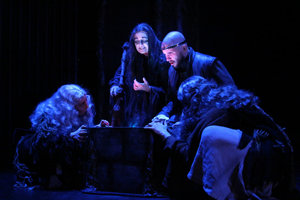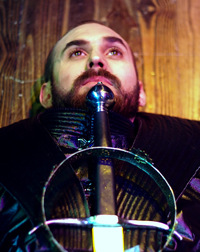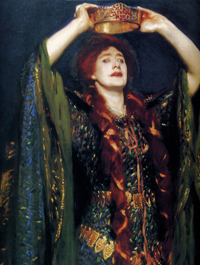
Source: Hart House Theatre’s Macbeth, Daniel DiMarco, Flickr
The plot of William Shakespeare’s Macbeth is set in motion by the prophecy of three witches. The prophecy creates an overwhelming sense of ambition in Macbeth and his wife, Lady Macbeth. The witches’ prophecy convinces the two of them to plot and carry out the murder of King Duncan. The murder of the King leads to other murders that eventually lead to MacBeth’s demise.

Source: Macbeth and sword, benbeck, Flickr
Would Macbeth have committed such terrible crimes if he hadn’t heard the witches’ prophecy? We will never know since it turns out to be self-fulfilling. The prophecy and other occurrences throughout the play create the dramatic irony that underlies this tragedy. Pride and lust for power drive characters to do terrible things, and their words and actions create a sense of dread. The witches know about Macbeth and Lady MacBeth’s lust for power and irresistibly tempt them with a future in which he is king. Their visions motivate Macbeth and his wife to take action. Eventually, however, the prophecies prove fatal to both characters. Blinded by ambition, they fail to see their inevitable ruin.
In act I, scene 6, we know that MacBeth and Lady Macbeth have planned to murder Duncan. Here we see the King coming to their castle to stay the night. The dramatic irony is that we know the Macbeths want to kill him as he shows up to spend the night in their house. We know what King Duncan does not. Pay special attention to his dialogue as he greets MacBeth and Lady MacBeth in this excerpt.

Source: John Singer Sargent’s “Lady Macbeth,” D Flam, Flickr
Act I, Scene 6
DUNCAN
This castle hath a pleasant seat; the air
Nimbly and sweetly recommends itself
Unto our gentle senses.
BANQUO
This guest of summer,
The temple-haunting martlet, does approve,
By his loved mansionry, that the heaven’s breath
Smells wooingly here: no jutty, frieze,
Buttress, nor coign of vantage, but this bird
Hath made his pendent bed and procreant cradle:
Where they most breed and haunt, I have observed,
The air is delicate.
Enter Lady Macbeth
DUNCAN
See, see, our honour’d hostess!
The love that follows us sometime is our trouble,
Which still we thank as love. Herein I teach you
How you shall bid God ’ild us for your pains,
And thank us for your trouble.
LADY MACBETH
All our service
In every point twice done and then done double
Were poor and single business to contend
Against those honours deep and broad wherewith
Your majesty loads our house: for those of old,
And the late dignities heap’d up to them,
We rest your hermits.
DUNCAN
Where’s the thane of Cawdor?
We coursed him at the heels, and had a purpose
To be his purveyor: but he rides well;
And his great love, sharp as his spur, hath holp him
To his home before us. Fair and noble hostess,
We are your guest to-night.
LADY MACBETH
Your servants ever
Have theirs, themselves and what is theirs, in compt,
To make their audit at your highness’ pleasure,
Still to return your own.
DUNCAN
Give me your hand;
Conduct me to mine host: we love him highly,
And shall continue our graces towards him.
By your leave, hostess.
Exeunt
Now watch act I, scene 6 in a stage production and notice how optimistic and happy King Duncan and his party are.
Source: Macbeth-1-6.mp4, Grocker2011, YouTube
Duncan’s friendliness and gratitude are apparent in the video you just watched. These traits serve to heighten the dramatic irony for the audience. We like Duncan as a king and a person, and we don’t want him to be murdered; our contempt for the MacBeths only grows as Lady Macbeth leads Duncan into their home.